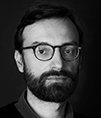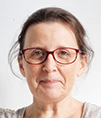(https://doi.org/10.55612/s-5002-056)

Tiziano Bonini
is a researcher at the Institute of Sociology of the Czech Academy of Science. Here, he is involved in RESISTIRÉ, an H2020 project aimed at designing solutions to mitigate socioeconomic inequalities connected with the COVID-19 pandemic. He also collaborates with the Department of Information and Library Studies at Masaryk University, where he was a lecturer in the “Designing technologies for/with communities” course. The common thread of his interdisciplinary research path has been the attention to the dynamics of interaction between different human and non-human actors in the construction of technoscientific knowledge and artifacts, with particular attention to the power dynamics involved. His current research reflection and academic production focus on gender and feminist studies, and on the debate about the involvement of interested communities in designing technology, platforms, and services to support empowerment, inclusion, and sustainability

Kolja Bopp
since 2019 has been a scientific staff member at the University of Applied Sciences Hamburg. In his research he focuses on learning and cultural aspects in games. Previously he worked in the field of human robot interaction and serious games at the Karlsruhe Institute of Technology. In 2015 he founded the game studio Cultural Games and specialized in game and level design. Kolja Bopp holds a master degree in social science of the Albert-Ludwigs-University Freiburg i.B.

David Castro
is a highly skilled software development professional bringing more than three years of experience in software design, development, and integration of 2D and 3D. David had advanced knowledge of JAVA, C#, and Python. It has expertise in computer graphics, management, and creation of virtual environments under the Unity engine, to developments for JAVA. Multi User interactive experiences and development of autonomous agents traveling in virtual spaces and interacting with users who are in the virtual environment.

Roberto Cibin
is Associate Professor in Sociology of Media and Culture at the department of social, political and cognitive sciences at the University of Siena, Italy. He teaches sociology of communication (MA) and Mass media, digital culture and society (BA). His research interests include public service media, critical political economy of the media, platform studies, media production studies and digital cultures. His forthcoming book, entitled Algorithms of Resistance (co-authored with Emiliano Treré) will be published by MIT Press in 2024.

Robert Clements
is a neuroscientist who teaches and performs research at Kent State University. He develops and uses different three-dimensional (3D) imaging techniques to understand diseases of the brain, for virtual and physical reconstruction as well as education. Dr. Clements’ research aims to visualize our brains’ three-dimensional structure for better disease diagnosis and therapies as well as improve how we learn, experience, and perceive 3D environments and objects.

Richard E. Ferdig
is the Summit Professor of Learning Technologies and Professor of Educational Technology at Kent State University. He works within the Research Center for Educational Technology and also the School of Teaching, Learning, and Curriculum Studies. He earned his Ph.D. in Educational Psychology from Michigan State University. He has served as researcher and instructor at Michigan State University, the University of Florida, the Wyzsza Szkola Pedagogiczna (Krakow, Poland), and the Università degli studi di Modena e Reggio Emilia (Italy). At Kent State University, his research, teaching, and service focus on combining cutting-edge technologies with current pedagogic theory to create innovative learning environments. His research interests include online education, educational games and simulations, the relationship between faith and technology, international education, and what he labels a deeper psychology of technology. In addition to publishing and presenting nationally and internationally, Ferdig has also been funded to study the impact of emerging technologies such as augmented reality, virtual reality, and K-12 Virtual Schools. Rick was the founding Editor-in-Chief of the International Journal of Gaming and Computer Mediated Simulations, the past Editor-in-Chief of the Journal of Technology and Teacher Education, a Consulting Editor for the Development Editorial Board of Educational Technology Research and Development, and the current Editor-in-Chief of the Journal of Interactive Learning Research.

Marta Fernández-Ruiz
PhD in Media Research (2013) from Universidad Carlos III de Madrid – UC3M. Lecturer and coordinator of the Degree in Video Game Design and Development at Image Processing and Multimedia Technology Center, Universitat Politècnica de Catalunya – UPC. She conducts research on Game Studies: video games and media ecology (transmediality, intertextuality, remediation); the impact of video games beyond entertainment (serious games); and new game experiences linked to emerging technologies.

Enrico Gandolfi
is an associate professor of Educational Technology at Kent State University with the Research Center for Educational Technology. His research interests include games and simulations for learning, augmented and virtual reality, accessibility and critical design in education, and online communities of inquiry. He is author of several peer-reviewed articles (for academic journals like New Media and Society, British Journal of Educational Technology, Technology in Society, Journal of Gaming & Virtual Worlds, Convergence, Games and Culture, Simulation and Gaming, E-learning and Digital Media, Information Visualization, Feminist Media Studies, International Journal of Information and Learning Technology) and book chapters (for publishers like Routledge, MIT Press, ETC Press) about these topics, and of the monographs Piloti di Console (Edizioni Paoline, 2011), Nerd Generation (Mimesis, 2014) and Independent Videogames (Unicopli, 2015). He has been co-PI and key personnel for several grants awarded by the National Science Foundation, the GAR Foundation, and the National Endowment for Humanities.

Ralf Hebecker
since 2012 has been Professor of Games Design and Production at the University of applied sciences Hamburg (HAW Ham- burg), from 2006-10 he taught as lecturer for Interaction Design at Otago University in New Zealand. He is also software- and game designer, creative director and project manager for all forms of media projects and co-founder and manager of the media companies nova, Kayzerfish and most recently Kuti, a manufacturer of child-friendly game consoles. As researcher, teacher and author he is mainly active in the areas of playful learning, game and communication design.

João Jacob
is a Technical Product Owner at Mindera. His background is in informatics, specifically computer graphics and human-computer interaction. He has experience working on Virtual Reality, Game Development, Multi-Agent Systems and Simulators, both in the industry and academia (more than 10 years), and as a lecturer. He’s the author of several papers and book chapters on these topics, having participated in several projects, supervised both MSc and PhD theses. He currently acts as a Technical Lead on several projects in Mindera Gaming.

Stéphanie Jean-Daubias
is a full professor at the CNRS LIRIS laboratory and the IT department at Lyon 1 University. As a researcher in TEL (TEchnology Enhanced Learning) and Knowledge Engineering, her research focuses on educational software, and more specifically on the personalisation of learning, authoring tools and user assistance. She has been teaching HCI and software ergonomics for over 20 years, and regularly puts out innovative teaching materials.

Derya Karadag
completed her degree in Architecture at Y?ld?z Technical University, Faculty of Architecture. She continued her academic journey at the same university and earned her master’s degree from Computer-Aided Architecture Program. Later, she furthered her expertise by completing her Ph.D. from Mimar Sinan Fine Arts University in the Architectural Design Issues Program. Currently, she is a faculty member at FMV Isik University, Faculty of Arts, Design, and Architecture. Her research interests lie at the intriguing intersection of digital culture, technology, and architecture. Her expertise encompasses creative thinking, computational design, building information modelling, artificial intelligence, gamification, and virtual reality. Through her exploration of these dynamic fields, she continues to push the boundaries of innovation in architecture and design.

Saskia M. Kelders
is Associate Professor at the Department of Psychology, Health and Technology at the University of Twente, Enschede, the Netherlands and extraordinary professor at Optentia Research Focus Area, North-West University, Vaal Triangle Campus. She chairs the ‘engaging eHealth Technology lab’ at the University of Twente which focuses on improving development, evaluation and implementation of digital health interventions. Her work combines technological and psychological perspectives and is multidisciplinary in nature. She uses innovative research designs and concepts to investigate the relationship between technology, engagement and effectiveness (e.g. fractional factorial RCT; engagement). Currently, she works on her personal ERC Starting grant on engagement as a mechanism of impact for digital mental health interventions. In this innovative new research line, she uses new-to-field and challenging research methods (e.g. single case experimental design, realist evaluation, personalizes and adaptive interventions) by e.g. making smart use of the possibilities of technology. She is also editor of the new eHealth handbook with contributions from many influential (inter)national scholars, and lead educator of a massive open online course (MOOC) on eHealth with over 23.000 participants.

Chris Lenart
is a Computer Scientist and engineer who performs research as a graduate student at Kent State University. Where he has obtained his Bachelors (BS) and is perusing his Masters (MS) in computer science. His research is focused on Computer Graphics, Extended Reality (XR) and edge computing. He hopes to provide frameworks for robust visual systems in educational settings.

Eduardo Magalhães
Holds a Bachelor´s Degree by the Higher School for Music and Entertainment Arts (ESMAE) He earned his Master´s Degree in Multimedia- Interactive Music and Sound Design, by the Faculty of Engineering, at the University of Porto, where he is presently developing his PhD Thesis in the field of exploration and sound interaction design for immersive, virtual environments. He has developed his activity as a professor and researcher, having taken part in parallel projects of independent cinema, digital games, virtual reality, as well as in the production of musical projects, be they of music by his own authorship, or of other artists. He has also been involved in experimental projects to build sound installations and field recordings. He is currently teaching at the Faculty of Engineering, by the University of Porto, at University Lusófona and at Escola Superior de Design (ESAD)

Juan Sebastian Parra
is a Multimedia Engineer from the Universidad Autónoma de Occidente in Cali. During his university studies, Juan acquired programming, graphic design, and audiovisual production skills, which allowed him to work on innovative multimedia projects. After graduating, Juan started working as a developer in an agency, where he has been involved in web design and project management projects. He has also had to respond promptly to the company’s cli

Carlos Peláez
is Ph.D. in Engineering from Mutis network university consortium in the computer sciences and multimedia research line. He is a professor in the Faculty of Engineering at Universidad Autónoma de Occidente, Cali, Colombia, and a member of the Telematics and Applied Informatics research group. His areas of interest are Multimedia Systems, User Experience, User-Centered Design, and Software Engineering.

Héctor Puente Bienvenido
PhD in Sociology (2015) from Complutense University of Madrid (2008). Professor of statistics, data analysis and coordinator of the master’s degree in Research Methodology in Social Sciences (UCM). He is currently part of the Ordinary Sociology research group (UCM). He has been a visiting researcher at the IT University of Copenhagen, the Georgia Institute of Technology (GaTech) and the Royal Melbourne Institute of Technology. His main areas of research are data analysis and the social implications of ICTs (mobile, social networks) and video games, especially in relation to the processes of interaction, social change and emergence; as well as the study of youth and leisure practices and cultures, virtual communities, technological mediations, agencies and user experience.

David Ruiz-Torres
PhD in Arts (2013) from the University of Granada (Spain) and professor in the Department of Theory of Art and Music and in the Post-Graduation Program in Arts of the Universidade Federal do Espírito Santo – UFES (Brazil). He is part of the research group of the University of Granada “Andalusia-America: heritage and artistic relations” (HUM 806) since 2011. His lines of research involve the use of new digital technologies in the fields of museology, cultural heritage and contemporary artistic creation.

Mark Scholten
received his PhD degree at the university of Twente in November 2021. Currently, next to his affiliation with the university of Twente, Mark is associated to the Utrecht university of applied sciences. Mark works on the implementation of AI and ICT within the educational system and as an offering to Small and Medium Enterprises. He is involved in several European Projects aiming for dissemination of AI knowledge within the Utrecht region. In addition, Mark is involved as a teacher in a Life Long Learning program on organizational transitions at the university of Amsterdam. Mark’s research specialty is in Human-Computer Interaction, with a special focus on Chatbots, Avatars, Virtual Humans, Agent Based Modeling and Dynamical Systems.

Juan Sebastian Sinisterra
is a Multimedia Engineer from the Universidad Autónoma de Occidente and UX designer. My areas of interest are multimedia content creation, programming, usability, and user experience.

Andrés Solano
is a professor in the Faculty of Engineering at Universidad Autónoma de Occidente (UAO), Cali, Colombia, and Director of the Research Group in Telematics and Applied Informatics (GITI) in the UAO. He received his Ph.D. in Electronic Sciences from Universidad del Cauca, Popayán, Colombia, in 2015. His areas of interest are Human-Computer Interaction, Usability Engineering, Multimedia Systems, and Software Engineering. He also is author of the several papers, all of them related to HCI.

André Sousa
is a sound designer at Giants Software Entertainment. His background is in sound design for non-linear media, mostly focused on games. During his master’s degree, he focused on the investigation of augmented reality and augmented audio for board games.

Maurizio Teli
is Associate Professor in the Department of Planning at the University of Aalborg, Denmark. He has always worked in interdisciplinary contexts, focusing on the political dimensions of the production and use of digital technologies and contributing to the participatory design of digital technologies. He has worked in or coordinated a few EU funded projects. Now, he is the Chair of the Centre for Sustainable and Digital Transformation at the TECH Faculty of IT and Design at Aalborg University, and Head of the Research Group “Techno-Anthropology and Participation” at the Department of Planning, Aalborg University.
